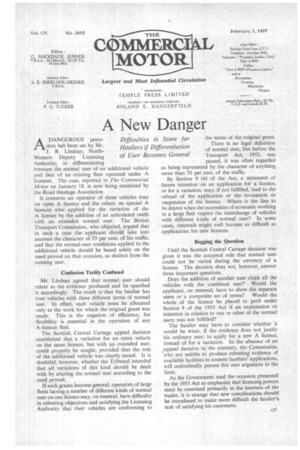A New Danger
Page 27

If you've noticed an error in this article please click here to report it so we can fix it.
ADANGEROUS precedent ha'§ been set by Mr. J. R. Lindsay, NorthWestern Deputy Licensing Authority, in differentiating between the normal user of an additional vehicle and that of an existing fleet operated under A licences. The case, reported in The Commercial Motor on January 18, is now being examined by the Road Haulage Association.
It concerns an operator of three vehicles (one on open A licence and the others on special A licence) who applied for the variation of the A licence by the addition of an articulated outfit with an extended normal user. The British Transport Commission, who objected, argued that in such a case the applicant should take into account the character of 75 per cent. of his traffic, and that the normal-user conditions applied to the additional vehicle should be based solely on the need proved on that occasion, as distinct from the existing user.
Confusion Trebly Confused Mr. Lindsay agreed that normal user should relate to the evidence produced and he specified it accordingly. The result is'that the haulier has tour vehicles with three different terms of normal user. In effect, each vehicle must be allocated only to the work for which the original grant was made. This is the negation of efficiency, for flexibility is essential in the operation of any A-licence fleet.
The Scottish Central Cartage appeal decision established that a variation for an extra vehicle on the same licence, but with an extended user, could properly be sought, provided that the role of the additional vehicle was clearly stated. It is doubtful, however, whether the Tribunal intended that all variations of this kind should be dealt with by altering the normal user according to the need proved.
If such grants become general, operators of large fleets having a number of different kinds of normal user on one licence may, on renewal, have difficulty in rebutting objections and satisfying the Licensing Authority that their vehicles are conforming to the terms of the original grant. There is no legal definition of normal user, but before the Transport Act, 1953, was passed, it was often regarded as being represented by the character of anything more than 70 per cent, of the traffic.
By Section 9 (4) of the Act, a statement of future intention on an application fok a licence, or for a variation, may, if not fulfilled, lead to the refusal of the application or the revocation or suspension of the licence. Where is the line to be drawn when the necessities of economic working in a large fleet require the interchange of vehicles with different kinds of normal user?. In some cases, renewals might well become as difficult as applications for new licences.
Begging the Question Until the Scottish Central Cartage decision was given it was the accepted rule that normal user could not be varied during the currency of a licence. The decision does not, however, answer three important questions.
Does the addition of another user cloak all the vehicles with the combined user? Would the applicant, on renewal, have to show the separate users or a composite set of terms? Would the whole of the licence be placed in peril under Section 9 of the 1953 Act if an expectation or intention in relation to one or other of the normal users was not fulfilled?
The haulier may have to consider whether it would be wiser, if the evidence does not justify his ordinary user, to apply for a new A licence, instead of for a variation. In the absence of an ,appeal decision to the contrary, the Commission, who are unable to produce rebutting evidence of available facilities to counter hauliers' applications, will undoubtedly pursue this new argument to the limit.
As the Government used the occasion presented by the 1953 Act to emphasize that licensing powers must be exercised primarily in the interests of the trader, it is strange that new complications should be introduced to make more difficult the haulier's task of satisfying his customers.




































































































